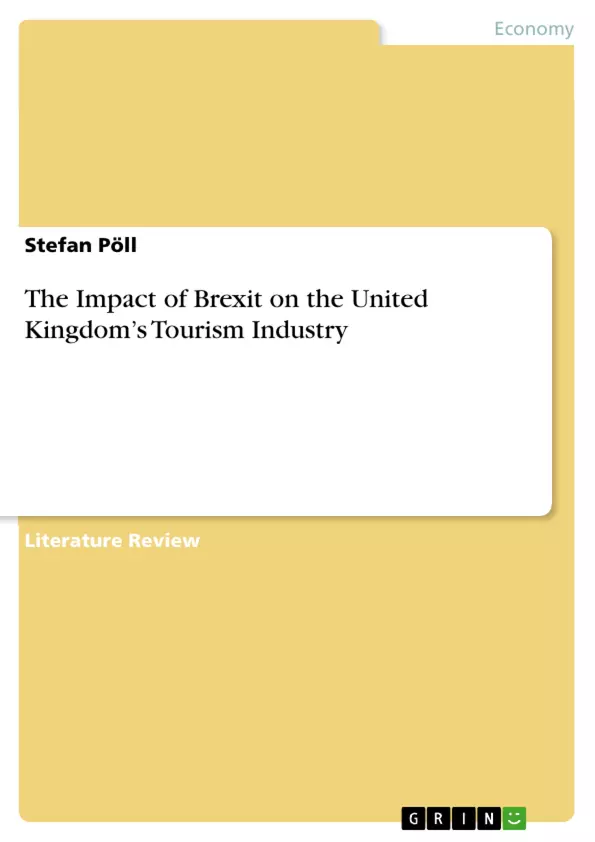Within this literature review, the impact of Brexit on the United Kingdom’s tourism industry is evaluated. Brexit is a source of much concern, uncertainty and anxiety for the tourism industry for both the United Kingdom and the European Union. The methodology used is content analyses of existing literature, government and industry surveys, as well as media articles concerned with the potential impact of Brexit on the tourism industry. This paper outlines some of the potential consequences Brexit could cause and results argue that the withdrawal from the membership of the European Union could bring up positive as well as negative implications for the United Kingdom’s tourism industry.
Inhaltsverzeichnis (Table of Contents)
- Abstract
- Introduction
- Current Situation
- Statement of Problem
- Specific Objectives
- Brexit
- Hard versus Soft Brexit
- Tourism
- Inbound, Outbound and Domestic Tourism
- Inbound Tourism
- Outbound Tourism
- Domestic Tourism
- Inbound, Outbound and Domestic Tourism
- Brexit's Influence on Tourism
- Inbound Tourism
- British Pound Sterling
- Travel Restrictions and Tourist Access
- Aviation Market
- Employment and Skills
- Outbound Tourism
- British Pound Sterling
- Travel Restrictions and Tourist Access
- Aviation Market
- Domestic Tourism
- British Pound Sterling
- Travel Restrictions and Tourist Access
- Aviation Market
- Inbound Tourism
- Conclusion
- Summary
- Critical Reflection
- Implications
- Outlook
Zielsetzung und Themenschwerpunkte (Objectives and Key Themes)
This literature review aims to evaluate the impact of Brexit on the United Kingdom's tourism industry. It investigates the potential consequences of the UK's withdrawal from the European Union on the tourism sector, considering both positive and negative implications. The review utilizes content analysis of existing literature, government and industry surveys, and media articles to understand the potential impact of Brexit.
- Impact of Brexit on the UK tourism industry
- Potential consequences of Brexit for inbound, outbound, and domestic tourism
- Influence of Brexit on travel restrictions, tourist access, and the aviation market
- Economic implications of Brexit on the tourism industry
- Analysis of the impact of Brexit on employment and skills in the tourism sector
Zusammenfassung der Kapitel (Chapter Summaries)
The introduction provides an overview of the current situation and the context of Brexit, highlighting the growing attention surrounding the impacts of countries withdrawing from supranational unions. It discusses the UK's decision to leave the EU and the resulting negotiation process. The introduction also emphasizes the significance of tourism as a cross-border industry and its vulnerability to Brexit.
The chapter on Brexit explores the concept of hard versus soft Brexit, outlining potential scenarios and their implications for the UK's relationship with the EU. The tourism chapter examines the different categories of tourism – inbound, outbound, and domestic – and their importance for the UK economy.
The main section of the review, "Brexit's Influence on Tourism", delves into the potential impact of Brexit on each tourism category. It analyzes the influence of factors such as the British Pound Sterling, travel restrictions and tourist access, and the aviation market. The chapter also considers the potential effects of Brexit on employment and skills within the tourism sector.
Schlüsselwörter (Keywords)
The main keywords and focus topics of this review include Brexit, tourism industry, inbound tourism, outbound tourism, domestic tourism, travel restrictions, tourist access, aviation market, economic impact, employment, skills, British Pound Sterling, and European Union.
- Citar trabajo
- Stefan Pöll (Autor), 2019, The Impact of Brexit on the United Kingdom’s Tourism Industry, Múnich, GRIN Verlag, https://www.grin.com/document/470096



